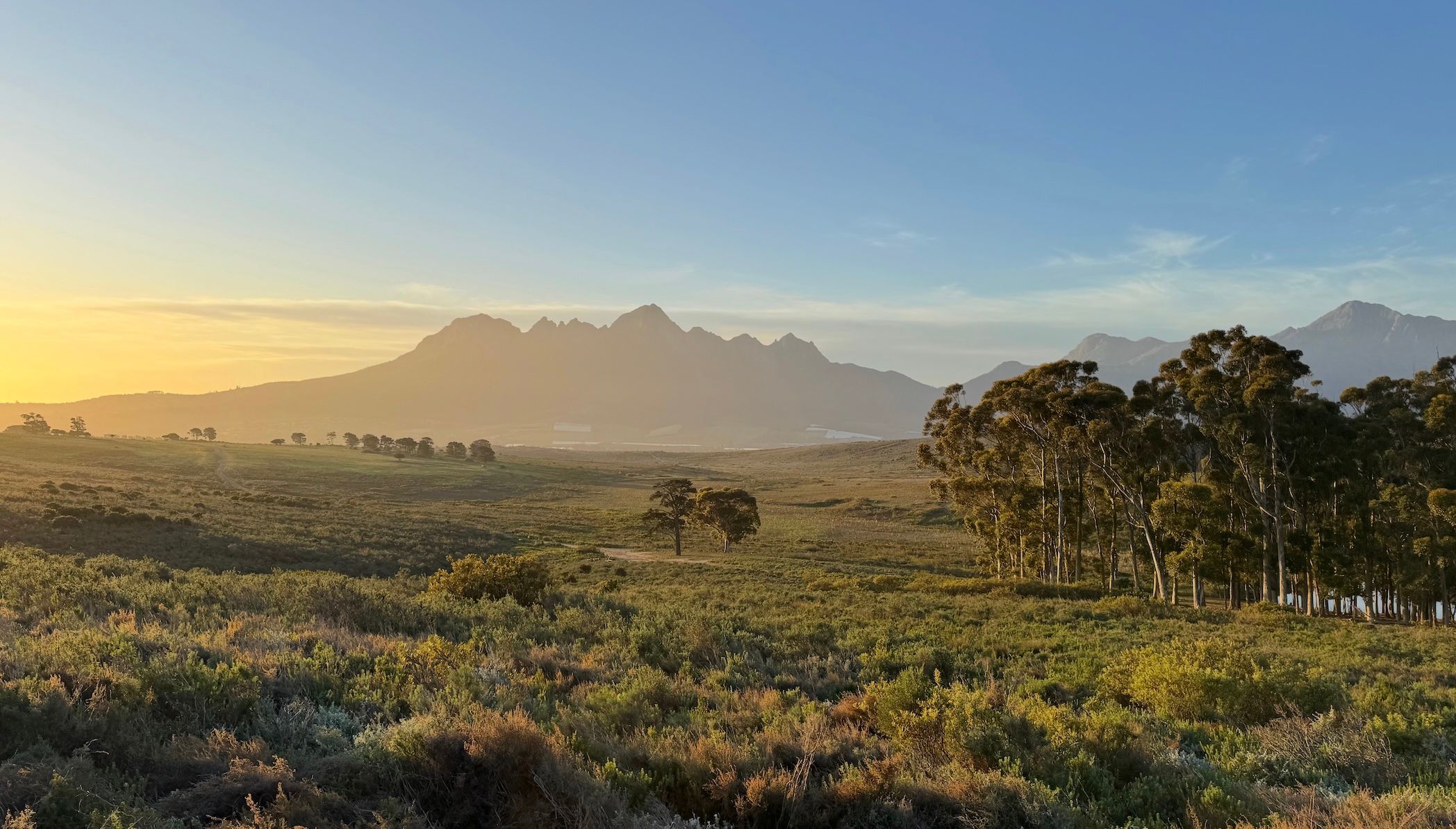It’s hard when you are in the cut and thrust of a wine exhibition to be able to fully assess what impact it will have when it’s over. But there was a moment during last month’s Cape Wine when I was able to stop and reflect on just what a unique trade event this is.
What other wine producing country in the world has the ambition to put on a three-day all-singing, all-dancing trade exhibition and open its doors to wine buyers from all over the world?
That‘s not to mention the near week long number of activities that take place either side of the fair with major generic and specialist tastings and dinners, be it for South Africa’s signature grape varieties, or to showcase its many wine regions.
What’s more this is not just a one off show. Cape Wine 2025 was remarkably its tenth edition.
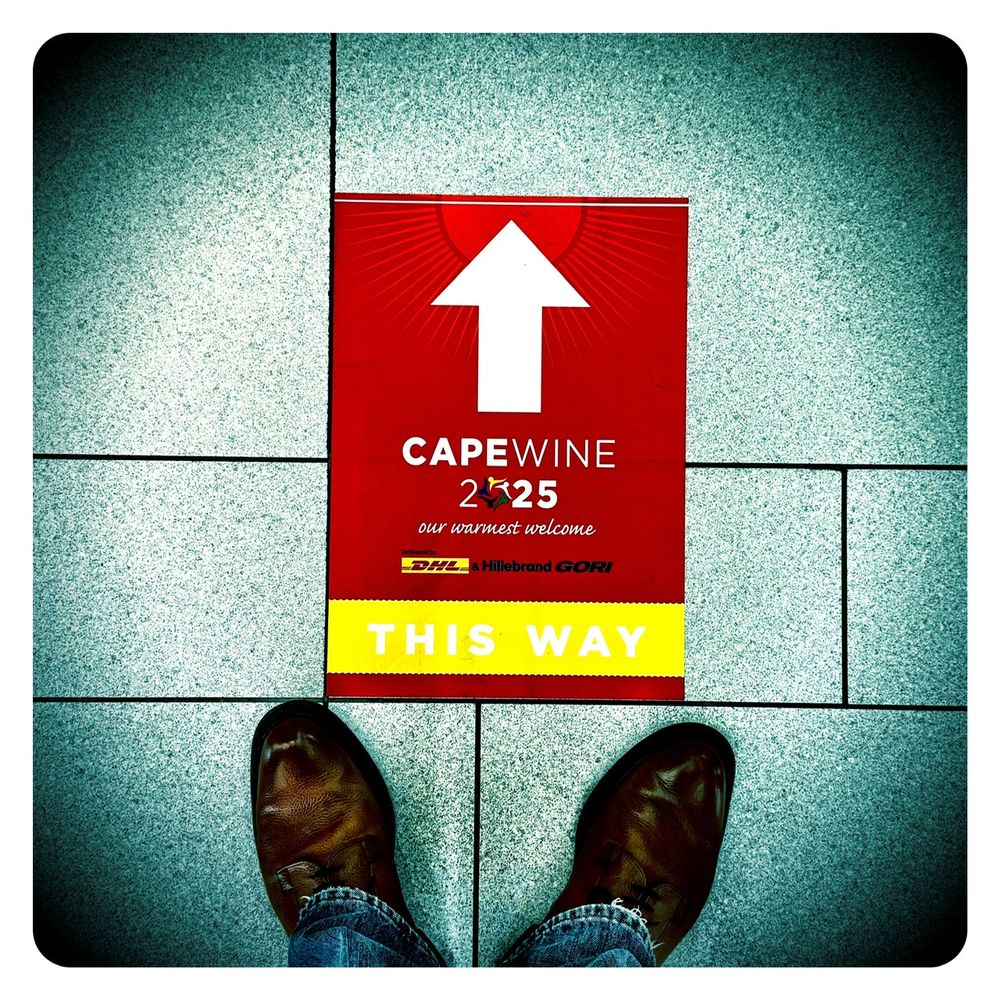
Buyers from all over the world descend on Cape Town for Wines of South Africa's Cape Wine trade show that takes place every three years. Picture Greg Sherwood.
I have been lucky enough to attend a good number of those over the last 15 plus years and been able to see first hand just how this country has grown up - particularly in the last decade - and blossomed and boomed into the powerful, confident wine producing country it is today.
It might still have plenty of issues and challenges to tackle - most notably over the viability of many its vineyards and growers - but this is a country used to living in adversity and crucially coming together to do what it can to overcome whatever barriers that are put in its way.
Collective spirit
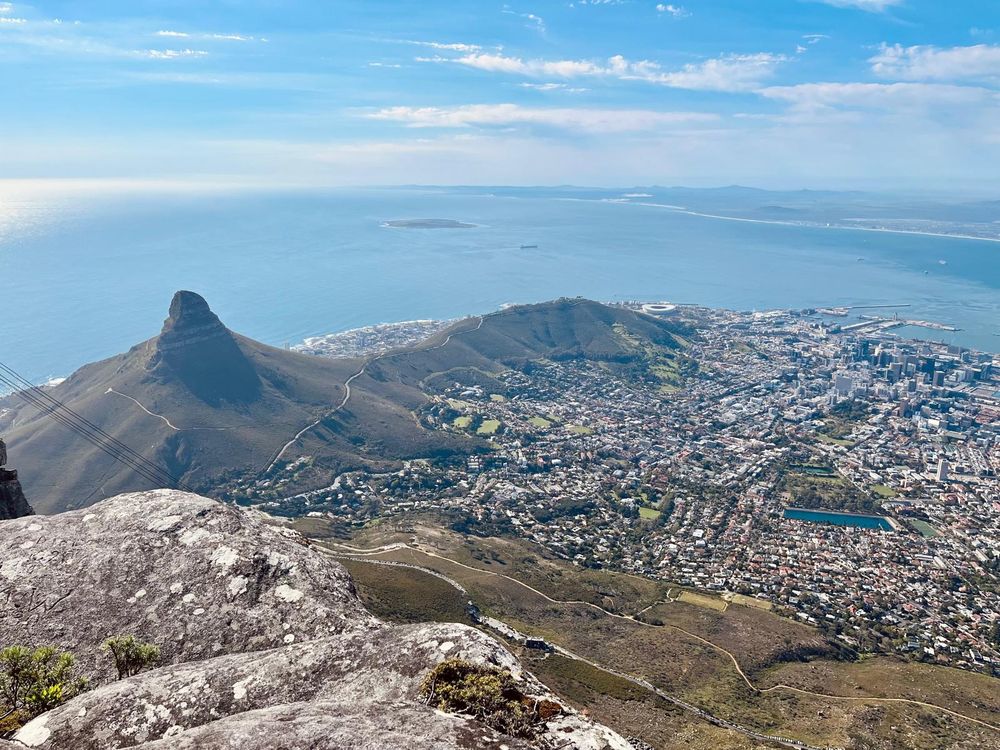
It's pretty hard to compete with South Africa, its stunning landscape and the comaraderie and collective spirit between its wine producers and winemakers
It is that collective spirit that is the beating heart of South Africa. A togetherness that is hard for any other wine producing country to compete with.
Mention the name of one winemaker to another and the chances are they will have either made a wine, shared a braii, or even gone surfing together. They would certainly have travelled the world to stand alongside each other at tastings and trade events all with the mission of promoting "Brand South Africa”.
Which is why bringing the whole South African wine industry together at Cape Wine is such a powerful force to reckon with.
One that acclaimed winemaker, Eben Sadie, sums up perfectly, when he says: "The South African wine fraternity moves as a unit. The power of the collective in South Africa is intoxicating. But we must remember our roots, always, and just stay humble.”
Hal Wilson, managing director of Cambridge Wine Merchants and a long time supporter of South African wine who works with 30 different producers, gives his perspective: “There seems to be a unified purpose in South Africa, from government trade policy to quality orientation to social engagement, that you don’t find elsewhere in the world. Wine is promoted as a force for good in the country.”
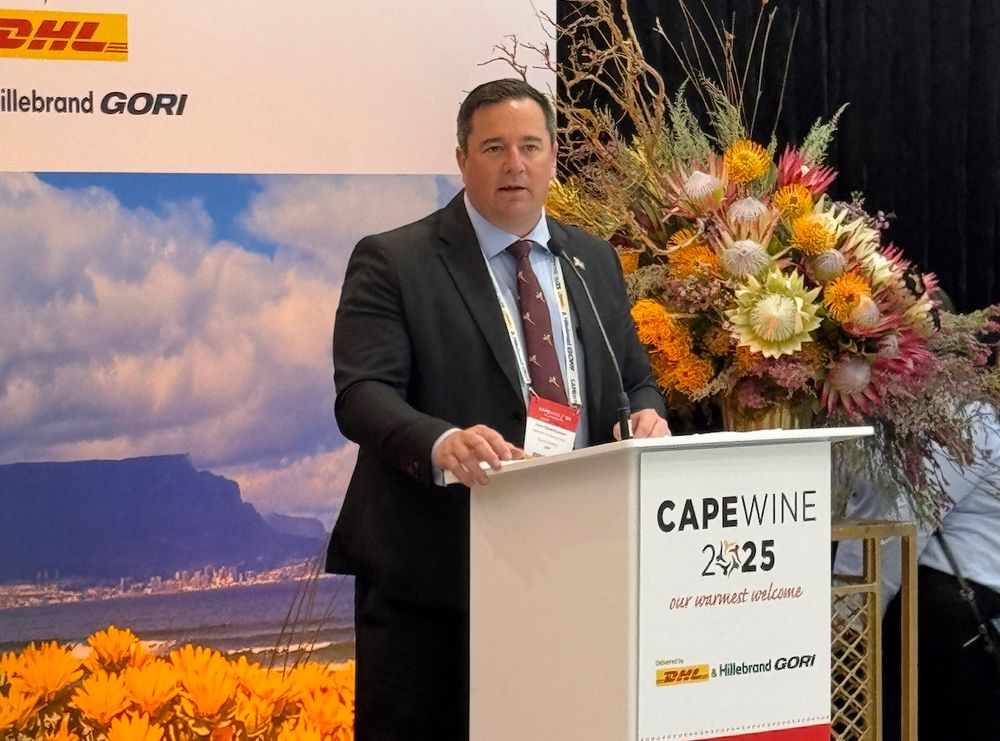
South Africa's agricultural minister John Steenhuisen came to Cape Wine committed to show the government's support for its wine industry
It was noticeable how involved and engaged the recently appointed minister of agriculture, John Steenhuisen, was at both Cape Wine and a separate evening debate that The Buyer was able to host where he repeated his message thatdespite the industry’s difficulties, it is “more united than ever before” and the government was prepared to play its part in working in “partnership” with the country’s wine sector.
An industry that now supports close to 300,000 people and contributes 1% of the country’s GDP (worth SAR56 billion).
He says he was committed to working with the South African industry to help tell its “authentic” story better and “to turn excellence into opportunity”.
“We must lean into origin, terroir and story, and let the Cape speak in the glass,” he says. Brand South Africa deserves to be on the biggest international stage.”
World stage
Cape Wine is clearly South Africa’s stage to shine on when it comes to its place in the international wine industry. A time when all the personality, ambition and vision of its winemakers and producers can come to the fore.
It’s why wine buyers, importers, wine merchants and the press make the effort, every three years, to go to South Africa to see what it has been up to.
The one thing South African producers can’t control, however, is just what attitude those global wine buyers are coming to South Africa with. How in tune are they with what the current South African wine industry is all about? What are the prices they are expecting to pay for its wines?
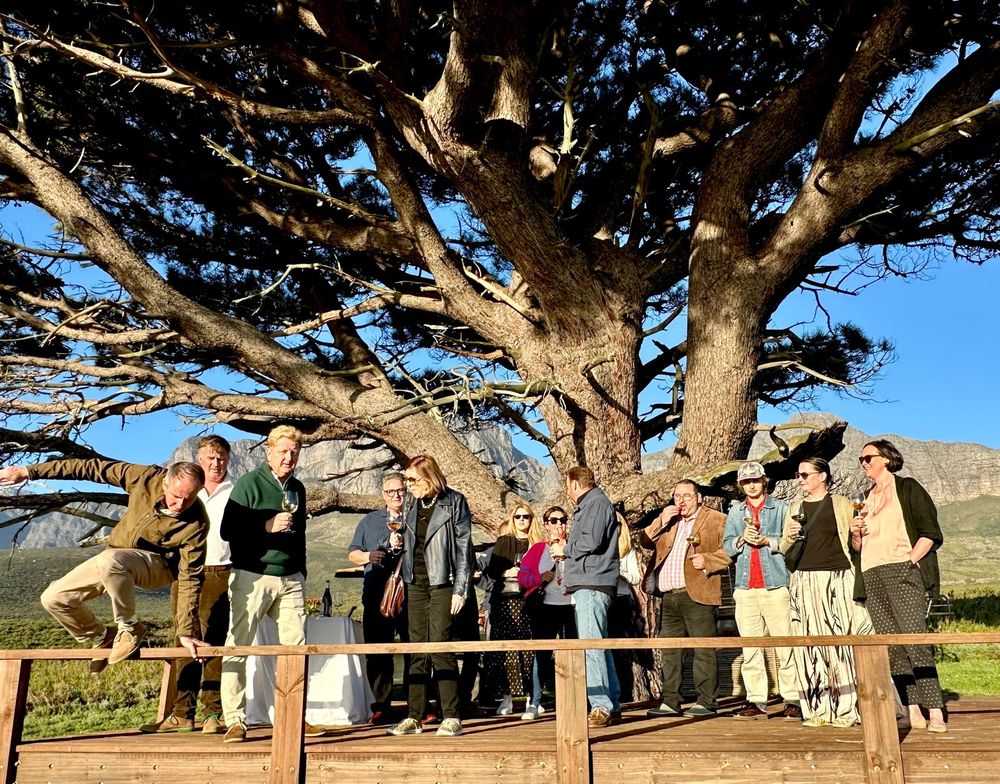
The Wines of South Africa invited group from the UK enjoying a typically memorable tasting experience - here at Vergelegen
Cape Wine is the chance for producers to make their case to the world, set out their stall, and make sure international buyers go home fully aware of what commercial opportunities there are for them and their businesses.
Here we set out what some of South Africa’s biggest calling cards are alongside the issues and challenges some of the international buyers raised at this year’s Cape Wine.
Market volatility
In order to analyse where South Africa’s opportunities are at the premium end of the market it is important to assess where it currently sits within the global wine supply chain. For whatever is happening with harvests and pricing in Australia, New Zealand, Europe and South America will have a direct impact on what wines are being bought and sought after in South Africa.
Andy Talbot, managing director of Off Piste Wines, that relies on South Africa for a lot of its wine, says the country is currently going through a “hard time” internationally in the commercial wine market as it has been affected by the over supply of wine in Australia, in particular, and New Zealand. It means buyers can get a lot more value and bang for their buck by sourcing fruit and key grape varieties from other countries.
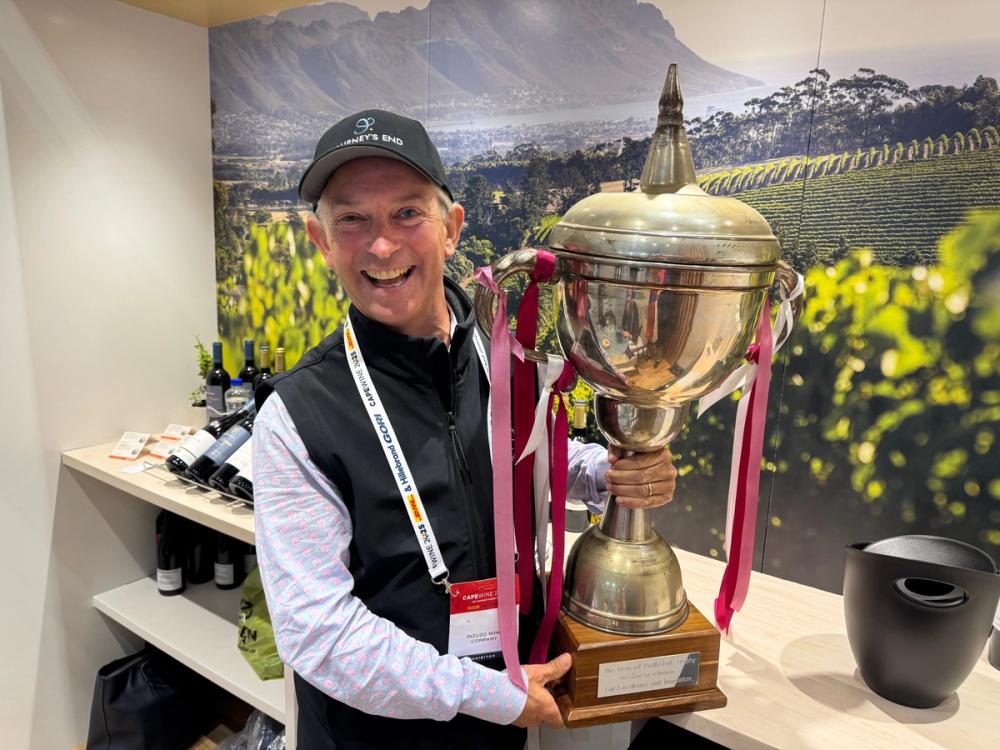
Journey's End Rollo Gabb says South Africa is going through a difficult time due to the volatilty in the global wine market
Rollo Gabb, managing director of Journey’s End, which produces a wide range of wines for a number of major retail and on-trade customers, says South Africa is being caught to some extent, particularly at the commercial and entry level end of the market, by the vagaries of global wine supply and, in the UK, the fall out from the changes in duty and overall increase in costs.
Whilst it was ideally placed to benefit from New Zealand’s sudden shortage of Sauvignon Blanc following its small harvest in 2021 it has now lost a lot of that market position since the New Zealand market has returned.
Duty changes and increased trade demands for lower ABV wines has made the UK retail market “very unpredictable” and resulted in a confused shopper not knowing what wines they are going to see down the wine aisle, adds Gabb.
The issue for South Africa, stresses Talbot, is that it lacks really strong brands that “can challenge the pricing system” and stand to some extent outside global supply chain dynamics.
Yet it is very different story in the on-trade and that is where South Africa can really look to push its premium story, believes Gabb. It is where it is driving premium wine sales, pointing to the latest Wine Business Solutions UK on-trade research which shows South Africa as one of the best performing countries - with listings up 4% and average bottle prices up 9%.
Value and consistency
The biggest commercial advantage South Africa has is the quality and consistency of its wines. That was the biggest difference at this year’s Cape Wine. Consistency and quality across the board. Stand after stand. Producer after producer.
But “value” can mean different things to producers vs buyers. South Africa has built much of its global reputation on the value for money of its wines. Largely because of its huge bulk wine industry that makes up 55-60% of its 300-320 million litres of export volumes a year.
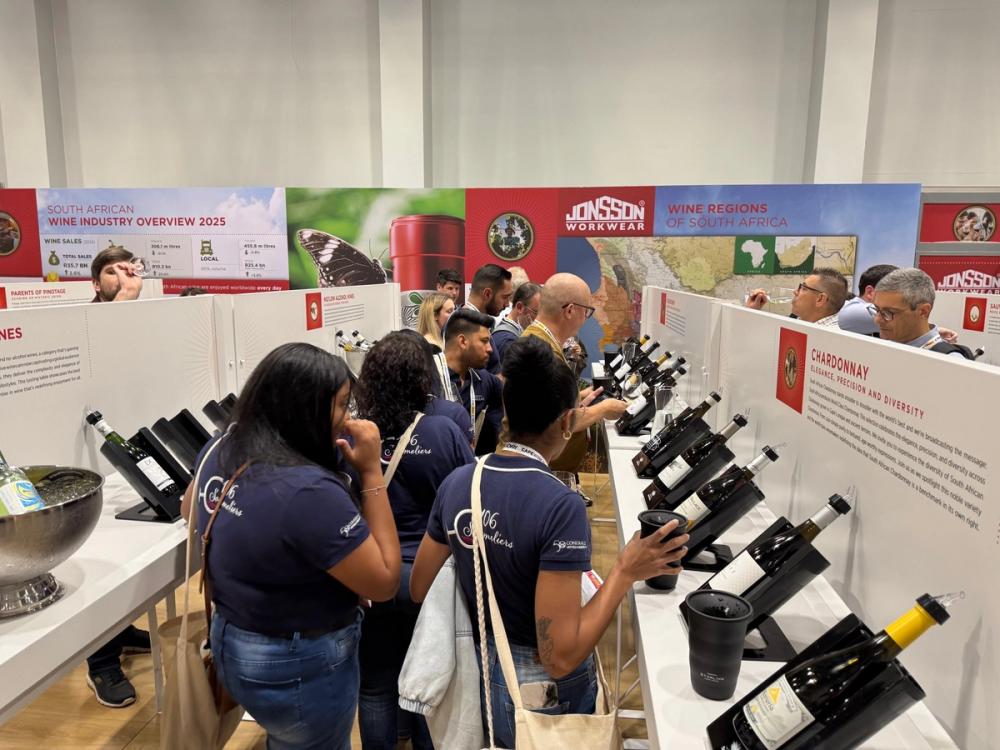
It is an uncomfortable fact that for all those pushing for premium sales of South Africa the majority of its wine is leaving its shores in a flexitank rather than a bottle.
The balance, though, is shifting. Whilst, for example, prior to Covid 25% of South Africa’s exports went to the UK in volume that only equated to 18% of its value. Now it is closer to 25% of exports and 25% of value.
South Africa is now the sixth ranked country in the world by export value, accounting for 3.6% of global wine exports and 3.9% of global wine production.
For every own label and exclusive wine a major producer might negotiate with a major on or off-trade buyer it now has the quality of wine to justifiably also call for slots in their premium portfolios too.
The difficulty is major buyers have got used to going to South Africa for their own label and exclusive wine brands, says Greg Wilkins, co-founder of Brand Phoenix that has built its business on the back of building brands from South Africa - most notably First Cape that it first brought to the market in 2001.
“South Africa is so fragmented at the entry level because it is dominated by own label and there is no consistency for the winemaker or producer,” he adds. “Own label can only get you so far. We have seen so many South African brands come and go as it is so hard to establish themselves for the long term.”
It is up to South Africa’s producers to convince the bigger, more influential retail buyers - from all of South Africa’s key export markets - to fully appreciate and respect South Africa for the wines it is making and not just come expecting to fill their boots with sub £10 wines.
There is clearly mounting frustration from leading producers that South Africa is still not being widely considered for the most premium price points on restaurant wine lists.
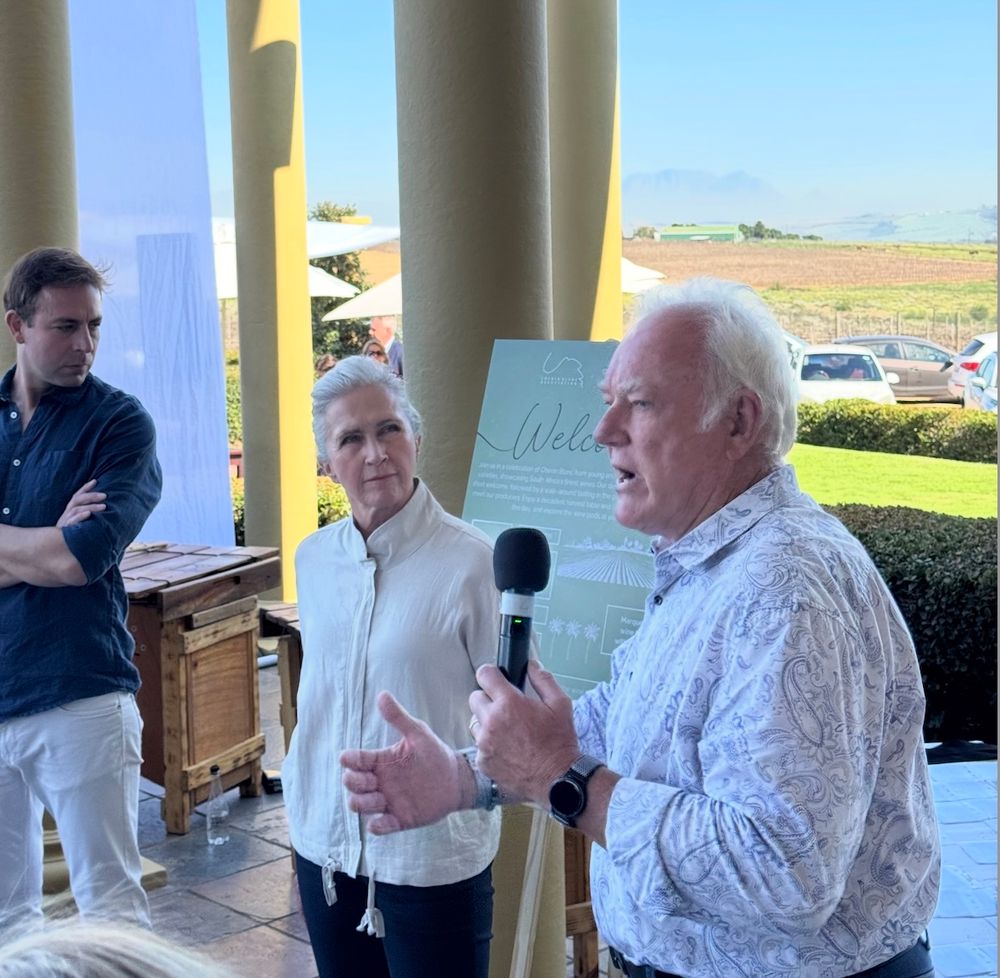
Ken Forrester says South Africa has earned the right to be respected on the global stage for it wines - here speaking at the Old Vine and Chenin Blanc Association tasting at Stellenrust
Ken Forrester says a chef in a top London restaurant would not consider putting a cheap cut of meat on their menu, but why is its wine team happy to list a Chenin Blanc sourced from bulk wine? The restaurant and hospitality sector has to raise its game too, he says.
Interestingly Oldenburg Vineyards, which surprisingly was not exhibiting at Cape Wine, has taken the strategic decision to almost double the price of some of its wines in order to better reflect the investment it has taken in its land, vineyards and winery and re-position the business and its wines a few more rungs up the premium pricing ladder and to demand prices it “thinks its wines deserve”.
A move that has seen it lose some listings, but increase its overall profitability and open up new business with accounts it has not worked with before, says Thys Lombard, Oldenburg’s international sales manager.
Pricing debate
Andrew Johnson, managing director of Woodwinters, which is certainly looking to do its bit to promote and sell premium and fine wines from South Africa, says there also needs to be a bit more realism about what producers can genuinely expect and ask for when it comes to pricing.
He explains: “As a fine wine merchant, I see a lot of value in the £18 to £29 category. There are many wines at this price point that admirably compete with wines which are £10 more expensive. I understand the need for wineries to make a decent profit, but you start to see a few wineries maybe being a little ambitious on pricing.”
That said he does not blame them for trying: “You could say South African wines have been underpriced and it needs trailblazers to push the market through these painful adjustments. There are a lot of these wines at £25 that in a few years will be more like £35,” he adds.
Forrester disagrees and says South Africa has been too long been "bullied" by buyers into certain price points by "saying our prices are too high - that's bollocks".
"They have helped to create a ceiling which I would like to see producers break."
The independent wine merchant sector in the UK has become a key market for South African wines and it’s also where there is scope and shelf space to sell its £15 plus wines.

Cambridge Wine Merchants' Hal Wilson is a long time supporter of South African wine and lists wines retailing up to £90 in his stores
Wilson says Cambridge Wine Merchants sells South African wines from “£6.50 (alcohol free) up to £90 a bottle and most price points in between”. Of which 80% is under £20 by volume and 45% between £10 and £20.
"That benchmarks close to the average for all our wine sales,” he adds.
Alex Milner, winemaker at Natte Valleij and one of the first to really explore and show what Cinsault can do in South Africa, says the US might be a bigger market for its wine, but the UK is where it can sell a “bigger spread” of its premium wines, working with Museum Wines that has just secured a listing with a couple of its old vine wines with The Wine Society.
Securing supply
A key theme to emerge at this Cape Wine was the number of major UK importers who are now securing their supply of wine from South Africa by setting up strategic partnerships with major producers and co-operatives that means they can make long term plans about the wine they can make and the customers they can sell them to.
Brand Phoenix was arguably the first to go down this route with its First Cape wine brand that started out from day one as a collaborative project with four major co-operatives, who have a shareholding in the business and are sourcing fruit from over 150 farms across the Breede River Valley. It is still topping, or near the top of UK South Africa’s off-trade sales, some 24 years later.
“It is a model that works really well to have the farmers on board. It means they have skin in the game. They are part of it,” adds co-founder, Steve Rosser.
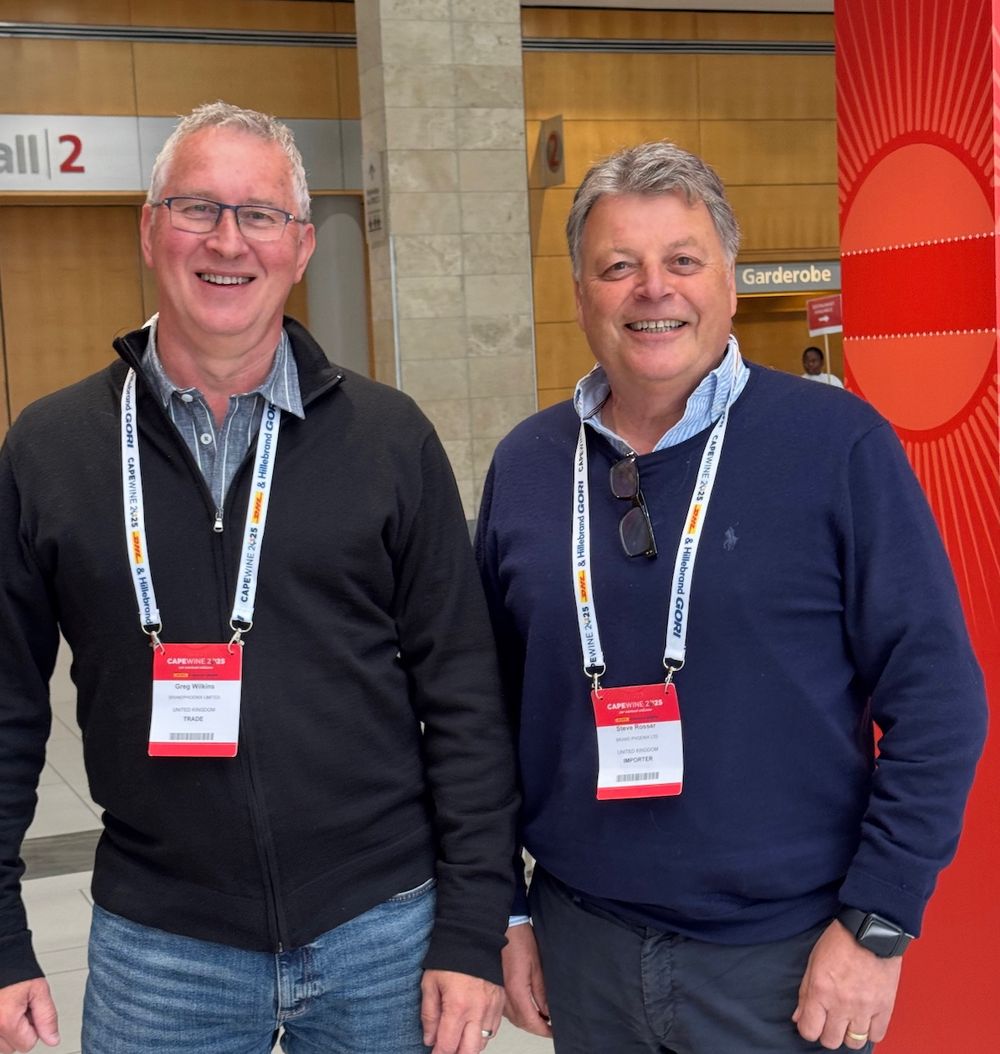
Brand Phonex's Greg Wilkins and Steve Rosser have just signed distribution partnership with Leapord's Leap to add to its near 25-year success with First Cape from South Africa
It has now signed a strategic deal to work with Leapord’s Leap and re-introduce the brand to the UK market where it has enjoyed such success in the past.
Wilkins and Rosser says it takes time, patience and a commitment to build the right relationships and find the right partners, but get it right and it is a winning formula to be able to bring their UK knowledge and trade contacts, particularly in the multiple retail arena, with strong producers - and shareholders - in South Africa and the other countries they work in.
Retailers are ultimately looking for true partners to work with that can find the solutions they want or come to them with fresh ideas, says Wilkins. That’s what they have prided themselves on at Brand Phoenix and the fact that Leopard's Leap has come forward as a new opportunity is testimony to the hard work put in over the years.
A brand they believe has such a strong legacy in the UK that it can quickly build a strong market position in the UK and act as a good strategic partner to Cape Wine a little further up the pricing ladder.
Collaborative partnerships
Off Piste Wines has long been collaborating with key wine partners in South Africa, most notably Willie Dreyer and Leeuwenkuil Family Vineyards, which claims to be the biggest vineyard owner in the country, thanks to the long-standing strategic alliance it has with them and influential winemaker Trizanne Barnard to help make, blend and be part of its wine operation in the county.
It means pulling together plans for making around 25 different SKUS and securing and sourcing the right fruit and planning where its next grapes need to come from. A lot of the wines, for example, for its Most Wanted range come through Barnard and South Africa.
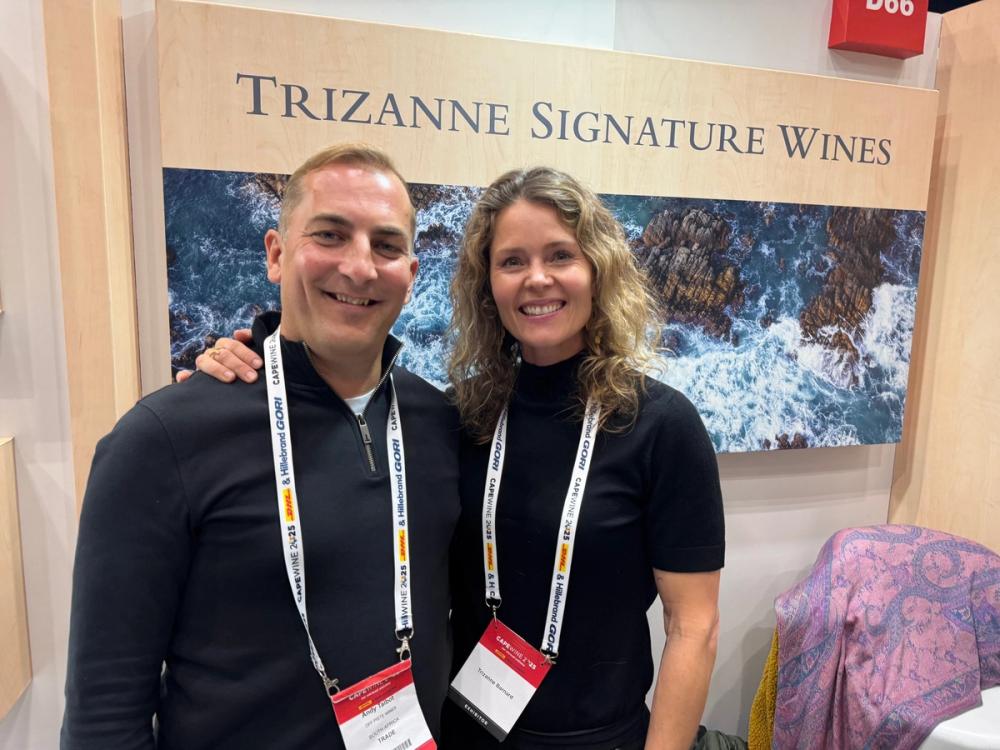
Off Piste Wines' Andy Talbot has forged a hugely sucessful partnership with Trizanne Barnard to help make and blend its exclusive wines from South Africa
“We understand what we can do together and we have a trusting relationship. It is a like-minded relationship and we can look to see how we can help each other. It has allowed us to grow to be such a power house in South Africa,” says Off Piste’sAndy Talbot.
Barnard was one of the first in the country to “break” the mould and become a renown independent winemaker in her own right without owning any vineyards or having a tie to any estate. Together with Off Piste Wines she has been able to “grow and scale the opportunity” there is in South Africa through strategic partners with producers and growers.
They have, for example, identified Malbec as being one of the big growth opportunities in South Africa and looked to secure and plant over a 100 hectares of Malbec at Leeuwenkuil.
She says where South Africa has a real advantage with Malbec, even over Argentina, is that its volumes are far more predictable and consistent compared to the big differences in harvests in Argentina.
Working so closely with Barnard and Leeuwenkuil has enabled Off Piste Wines to build up its international network of sales of South African wine, and it is exporting not only into the UK, but also Canada, the US and across Europe direct from South Africa. Off Piste Wines overall international sales now account for 15% of the business.
“We are having very different conversations with different markets, and it is interesting to see what is in demand where. It is up to us to identify what that consumer demand is,” says Talbot. “We have been able to expand over the years and grow where we want by staying and being relevant to retailers. It’s all about being resilient.”
Wine Fusion and Lanchester Wines is also working closely with Riebeek Valley Wine Company in the Swartland and managing director, Andrew Porton, sees them as being key in driving “strategic growth” in the country thanks to its access to some of the largest fruit in the region.
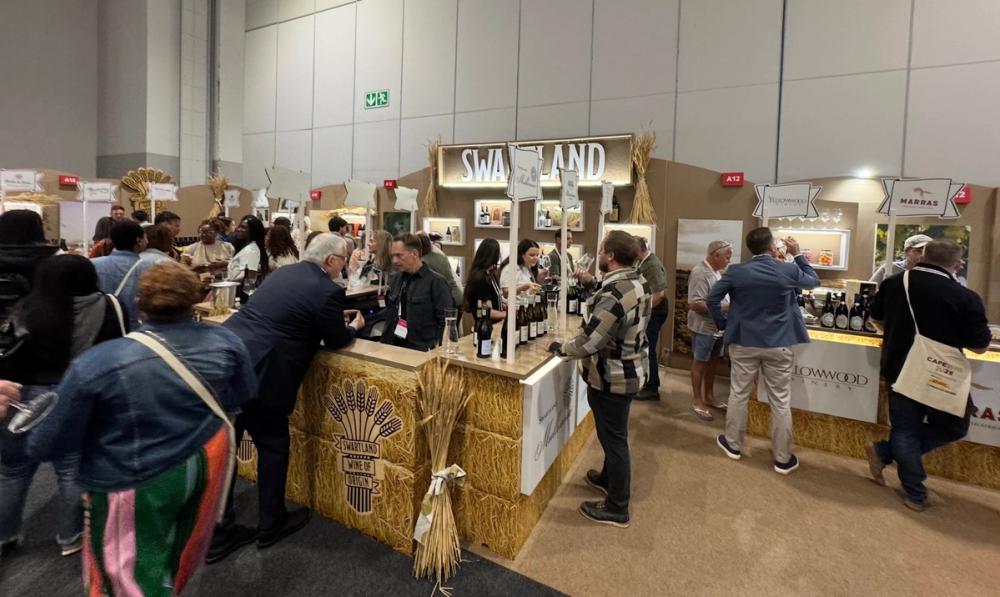
The Swartland producers at Cape Wine
Then there are the major South African producers who have set themselves up to be in prime position to win both the value deals and any of the more premium opportunities that come up in mainstream on and off-trade.
Journey’s End, for example, has long had a separate bulk wine business - Cape Wine Exporters - to lure the major buyers in with for own label and exclusive wines and is then well placed to talk to them about their quality premium wines at every multiple-focused price point.
Origin Wine similarly works in both the bulk and premium and retail sectors in order to maximise the opportunities from both.
Their combined challenge is pushing the price points of all South Africa’s wines and change the perceptions of what buyers expect and are happy to pay for those “value” wines.
One voice
The need for South Africa to talk even more consistently with one voice came out loud and clear in a panel debate I was asked to chair at a dinner during Cape Wine with Bruce Jack, founder of Bruce Jack Wines,Frans Smit, managing director of Spier Wine Farm and Naretha Ricome head of Advini South Africa, that has five estates in its portfolio -L’Avenir, Le Bonheur, Ken Forrester Vineyards, Kleine Zalze and Stellenbosch Vineyards.
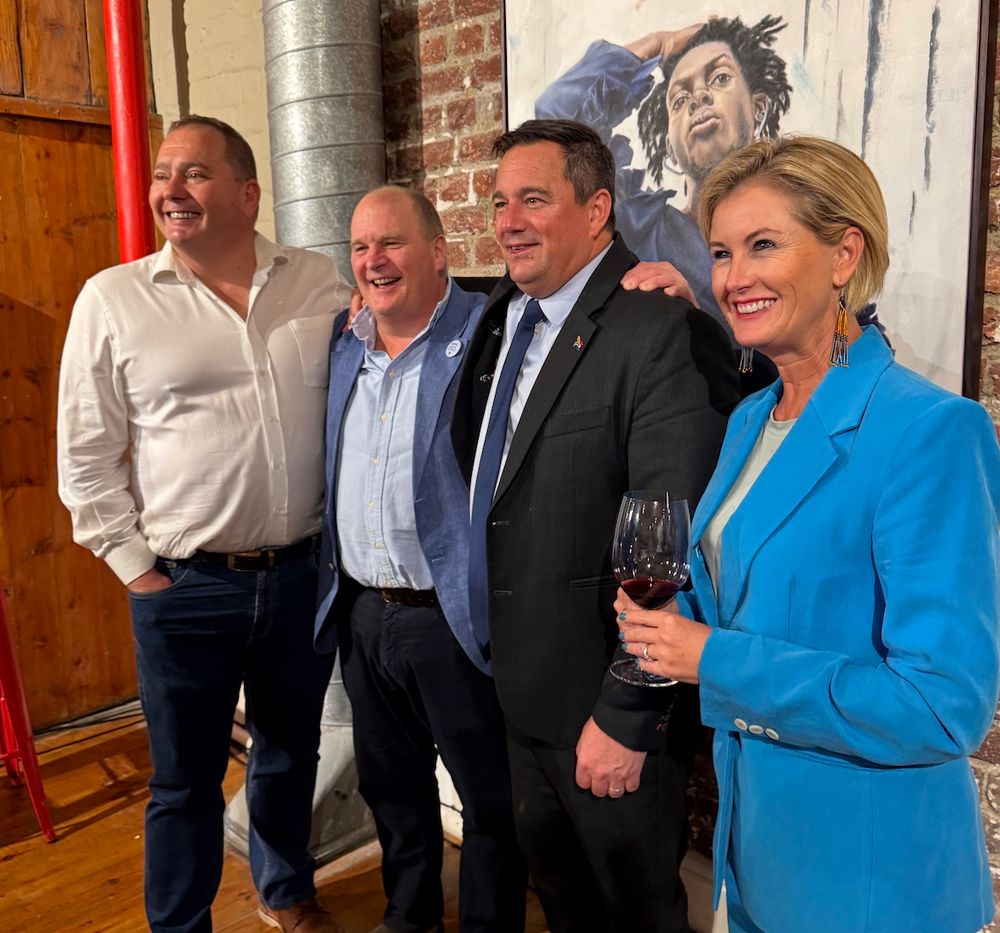
Spier's Frans Smit, Bruce Jack and Naretha Ricome head of Advini South Africa took part in a debate chaired by The Buyer's Richard Siddle on the future of South African wine at a side event at Cape Wine along with the minister of agriculture John John Steenhuisen
Together they looked to tackle the theme “From Discovery to Essential: Reframing South African Wine” and pick out the key characteristics - be it the powerful white grape variety Chenin Blanc, its social empowerment and sustainability programmes, wine tourism, and foreign investment - that South Africa needs to build on.
But it also shows how far and how fast South Africa has come for hosting such a debate would have felt a bit premature just 10 years ago.
Bernard Fontannaz, managing director of Origin Wine, that works with major retailers and buyers in the UK and around the world, says he was pleased to see the “positive” energy around this year’s show and a “thirst” from buyers for some “out of the box thinking and development”.
Buyers were not coming looking for more of the same and it is also up to South African producers to “keep them interested” and remain “relevant” by showing them new ideas, he stresses.
Which could be in terms of style - with more commercial and relevant orange and Pet Nat wines - grape varieties (like Palomino) and new areas to explore, like Piekenierskloof, he says.
"Buyers reflect what the market and, ultimately, the consumer wants. It is up to us to adapt to their demands and meet the market needs or else we will disappear,” he adds.
But equally producers needs to be strong and make clear what it is they “can do and, more importantly, what we will do”.
* In Part two of The Buyer's analysis of Cape Wine to be published later in the week Richard Siddle looks at the steps being taken to raise the quality of its wines, the importance of its old vines and sustainability strategies and how more producers are looking to expand and diversify by selling more wine into Africa.
